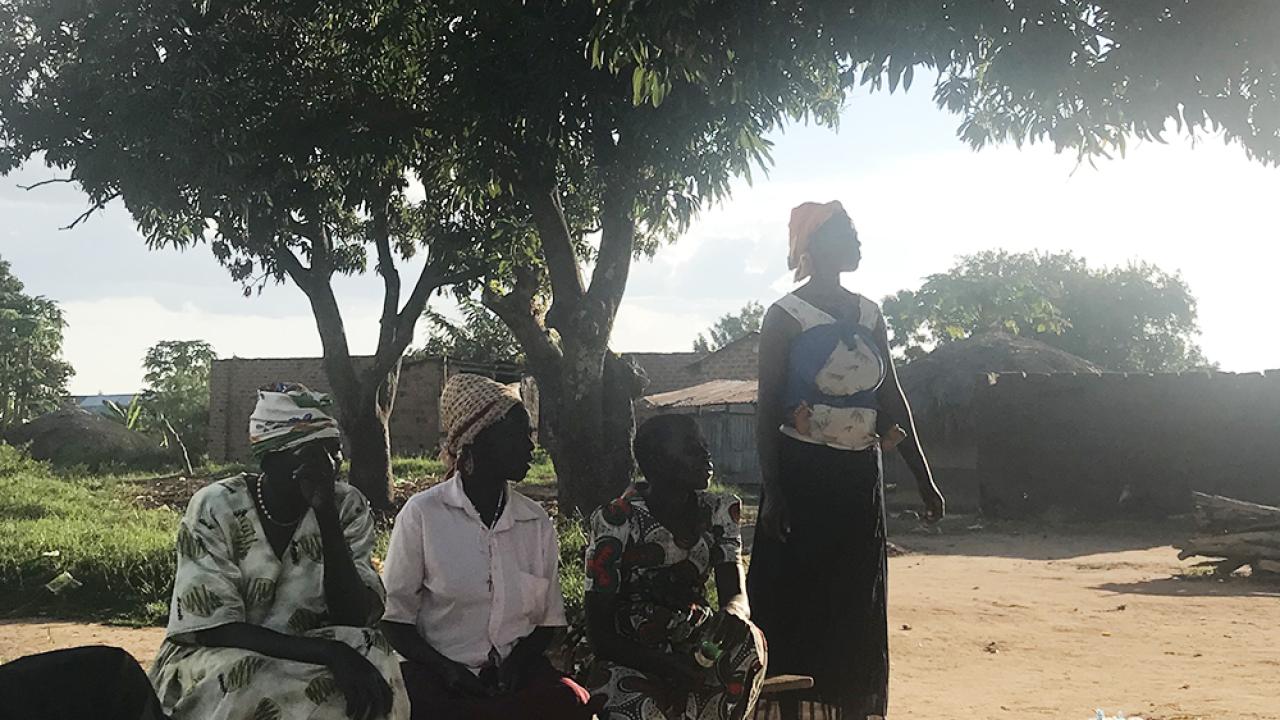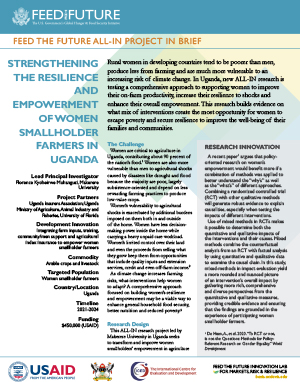
Rural women in developing countries tend to be poorer than men, produce less from farming and are much more vulnerable to an increasing risk of climate change. In Uganda, new ALL-IN research is testing a comprehensive approach to supporting women to improve their on-farm productivity, increase their resilience to shocks and enhance their overall empowerment. This research builds evidence on what mix of interventions create the most opportunity for women to escape poverty and secure resilience to improve the well-being of their families and communities.
Project Overview
Lead Principal Investigator: Florence Kyoheirwe Muhanguzi, Makerere University
Project Partners: Uganda Ministry of Agriculture, Animal Industry and Fisheries; University of Florida
Development Innovation: Integrating farm inputs, training and community support to empower women smallholder farmers
Commodity: Arable crops and livestock
Targeted Population: Women smallholder farmers
Country/Location: Uganda
Timeline: 2021-2024
Funding: $450,000 (USAID)
The Challenge
Women are critical to agriculture in Uganda, contributing about 90 percent of the nation’s food.[1] Women are also more vulnerable than men to agricultural shocks caused by disasters like drought and flood because the majority are poor, largely subsistence-oriented and depend on less rewarding farming practices to produce low-value crops.
Women’s vulnerability to agricultural shocks is exacerbated by additional burdens imposed on them both in and outside of the home. Women have less decision-making power inside the home while carrying a heavy unpaid care workload. Women’s limited control over their land and even the proceeds from selling what they grow keep them from opportunities that include quality inputs and extension services, credit and even off-farm income.[2]
As climate change increases farming risks, what interventions help women to adapt? A comprehensive approach focused on building women’s resilience and empowerment may be a viable way to enhance general household food security, better nutrition and reduced poverty.[3]

Research Design
This ALL-IN research project led by Makerere University in Uganda seeks to transform and improve women smallholders’ empowerment in agriculture and their resilience to agricultural shocks. The project employs a mixed methods approach that draws on expertise from economics, agriculture, social anthropology and gender studies. The project takes place in the Alebtong and Insingiro districts in Uganda, both of which have high levels of poverty, poor nutritional outcomes and a high risk of agricultural shocks.
The project begins with qualitative research with men and women farmers, community leaders, policy makers and technical staff to understand the local concepts of women’s empowerment and the agricultural shocks women face. The team is measuring women’s empowerment with pro-WEAI, which was developed by the International Food Policy Research Institute (IFPRI) with support from USAID to standardize field research on women’s empowerment in agriculture while providing flexibility to adapt to local contexts.
The team is also testing a suite of interventions that help women respond effectively to agricultural shocks. The interventions include (1) an input package of seed for stress-tolerant and nutrient-rich crop varieties and fertilizer made available via a revolving fund to enhance sustainability and (2) training on climate-smart agriculture technologies and practices, business skills and gender transformative approaches, all primarily targeted at women.
The interventions are implemented as a randomized controlled trial (RCT) to test their impacts on key outcomes that include household welfare, women’s empowerment and resilience to agricultural shocks. The research team has identified 48 savings/microfinance groups, from which ten women are selected at random to participate in one of five groups:
- T1: Input package and trainings
- T2: Input package only
- T3: Trainings only
- Control: No interventions
The study includes a total of 1,280 participants (640 women and 640 men).
Development Impact
Climate change is having an indelible impact on poverty in Uganda, causing frequent and intensive weather extremes leading to droughts, flooding, landslides, hailstorms and erratic rainfall that have increased rural poverty from 23 percent in 2012 to 25 percent in 2017.[4] Improving agricultural productivity now is critical considering forecasts that poverty will increase even more due to the current COVID-19 pandemic which caused severe disruptions to rural livelihoods, especially among women.
This project contributes directly to a number of USAID and Feed the Future objectives in Uganda. This includes strengthening and achieving a well-nourished population, understanding key drivers of vulnerability, increasing households’ capacity to manage risk and diversifying community and household assets. The project also maintains a strong focus on gender by seeking to empower women by increasing their access to financial resources, improved agricultural practices and reduced vulnerability to agricultural shocks.
National efforts have begun to focus on community-wide rural resilience and on women’s inclusion but separately.[5] This ALL-IN project integrates multiple approaches with a focus on improving women’s livelihoods as well as their empowerment. This research offers a window for policies that effectively address women’s vulnerability to agricultural shocks through interventions that will increase their agricultural productivity, help diversify their incomes and improve the wellbeing of their families.
[1] Feed the Future. 2015.
[2] FAO. 2019. “The State of Food Security and Nutrition in the World 2019. Safeguarding against economic slowdowns and downturns.”
[3] USAID. 2018. “Global Food Security Strategy (GFSS) Uganda Country Plan.”
[4] Uganda Bureau of Statistics. 2018.
[5] Financial Sector Deepening. 2018. “FinScope Uganda: Topline findings report, Kampala.”
This report is made possible by the generous support of the American people through the United States Agency for International Development (USAID) cooperative agreement 7200AA19LE00004. The contents are the responsibility of the Feed the Future Innovation Lab for Markets, Risk and Resilience and do not necessarily reflect the views of USAID or the United States Government.
